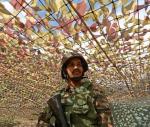You are here
Arab-Chinese relations: A forward perception and approach
Jan 21,2020 - Last updated at Jan 21,2020
The extensive development in the Arab-Chinese relations has been working fruitfully forward since the establishment of China-Arab States Cooperation Forum in 2004. China and many Arab states developed relationship on broad spectra, not only economic, but also trade and cultural aspects.
The BRI (the Belt and Road Initiative) announced by Chinese president Xi Jinping established an opportunity to consolidate Arab-Chinese relations and a common base to the cooperation, especially regarding the economic development in both parties’ interests and concerns.
Arab and Chinese intellectuals are discussing and exchanging their perceptions regarding these relations. They are looking forward to more profound, broader and more powerful dynamics. The aspiration of both parties is far beyond an interdependent economic relationship.
The motives and the mutual interests of both parties are enough to create the proper dynamics in economic, humanitarian, cultural and political relations. Most on the table are the crystallisation of a Free Trade Zone, oil and gas projects and the BRI fruits. The factors stand behind such determination by both parties to support consolidating these relations are still valid in spite of some differences in political and cultural approaches.
The most factors that impact the development of Arab-Chinese relations include: Economic, political social and cultural factors; China policies towards the Arab and Islamic world at large; the position towards main issues such as Palestine, Islamophobia, terror problem and approach including the western stereotyping of terror as “Islamic”. They also include the Arab evaluation of their fruits from the BRI success.
Many conferences have been convened by Chinese parties, including the significant research institutes in Beijing and Shanghai since 2016 up to 2019 focused on consolidation of these relations within an international spectrum with the participation of some Arab scholars and officials, including some from the Middle East Studies Centre’s scholars in Jordan.
Based on such optimistic aspiration of more profound relations between Arabs and Chinese, many Arab researchers and experts look forward to enhance these relations. They look forward to creating real, practical and developed expectations of these relations.
Many Arab experts support the consolidation of the strategic approach of both parties to these relations as well to create better understanding of cultural and social debates and differences. They also suggest widening the exchange of visits at intellectual and researchers including more in-depth and frank discussions of both concerns.
They believe that such development would create new literature based on cooperation and respect for each party concerns and interests regardless of the western approaches for both sides. The new suggested approach would enhance the role of research centers and university concerned departments to contribute in consolidating these relations.
Such aspirations would increase the Chinese active role on economic, humanitarian tracks within Arab-Chinese mutual view and interests. The Arabs and Chinese ought to create the proper dynamics towards great joint venture projects in the Arab and Islamic states regarding the economic development and infrastructure.
Moreover, at the political track of relations, China is called to support the Palestinian aspirations of ending Israeli occupation and exercising the right of determination and return to their land, including their right to use all means to achieve their legitimate goals. At the economic level, China is called upon to create industrialisation zones in Arab countries, especially in Jordan as a pivotal state and a member of the BRI.
At larger scale of cooperation, both parties would establish a joint committee specialised in the global cooperation between both sides on mutual and individual concerns including the escalation of Islamophobia worldwide, terror and extremism, the global trade problems and issues, the energy problem, the Palestinian cause at worldwide scale, the aspired role of Arab and Muslim nations in the UNSC and broader.











